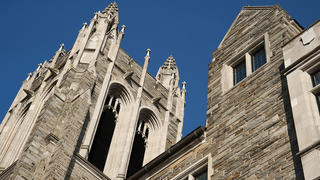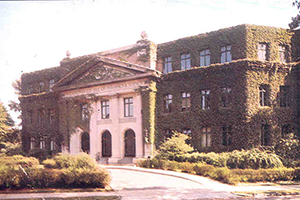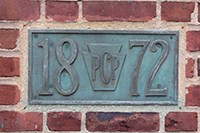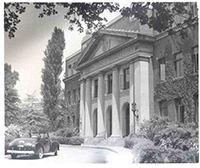The Growth and Death of the Ivy Tradition

Editor's note: This article was written prior to University of the Sciences' merger with and into Saint Joseph's University and does not reflect the current, combined institution. References to programs, offices, colleges, employees, etc., may be historical information.
 In January 1928, Philadelphia College of Pharmacy moved to West Philadelphia from Tenth Street in Chinatown.
In January 1928, Philadelphia College of Pharmacy moved to West Philadelphia from Tenth Street in Chinatown.
Everyone felt duly proud of the new building; none more than the alumni contributors who had waited so patiently for the program to come to fruition. Within six months the Alumni Association held its first reunion at the new location, drawing representatives from nearly every class between 1871 and 1928, with a few from 1868 (who witnessed the Tenth Street opening.)
 An ivy planting ceremony drew participants from over 39 classes who encircled the college and broke ground with a special invocation: "May this ivy plant, which symbolizes enduring growth, flourish and encompass this material building as does the love of her sons and daughters encompass their Alma Mater."
An ivy planting ceremony drew participants from over 39 classes who encircled the college and broke ground with a special invocation: "May this ivy plant, which symbolizes enduring growth, flourish and encompass this material building as does the love of her sons and daughters encompass their Alma Mater."
Twelve classes took the additional step of purchasing a plaque to identify their ivy plant, and the ivy planting rituals soon became an annual rite for the graduating class, with some classes going the extra mile to install a plaque. By 1938 there were 38 plaques that decorated the walls of Griffith Hall.
 The tradition stopped when the invasive ivy threatened the building with envelopment. The plantings stopped in 1945, although some classes continued to install a plaque with ivy etchings.
The tradition stopped when the invasive ivy threatened the building with envelopment. The plantings stopped in 1945, although some classes continued to install a plaque with ivy etchings.
There was never an ivy tradition at the college’s former home so it is likely that the inspiration for this new ritual was inspired by the institution’s neighbors at University of Pennsylvania. Penn’s classes often planted sprigs of ivy beneath a marking stone as a token of remembrance. This association of our country’s oldest institutions with ivy likely began in imitation of English forebears. Harvard and Yale adopted the custom after Penn while Princeton started in 1852.
